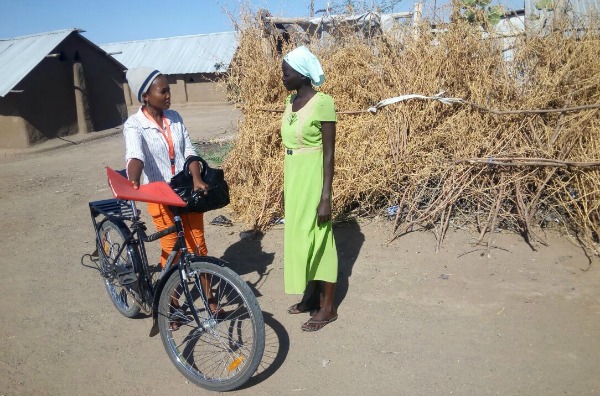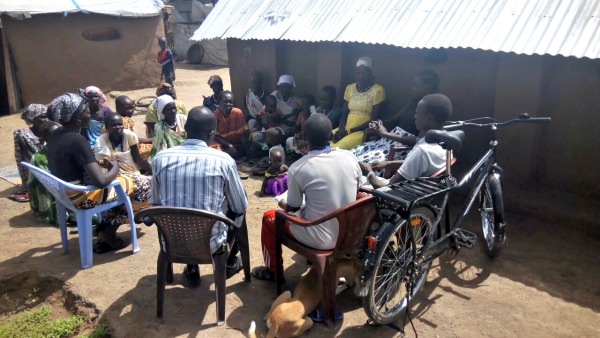
Community Counsellors in Kakuma Camp. (Michael Oyoo/JRS)
Sometimes people just need to talk and be listened to. World Health Day on 7th April recognises this and has as its 2017 theme ‘Depression: Let’s talk’.
“Depression affects people of all ages, from all walks of life, in all countries. At worst, depression can lead to suicide, now the second leading cause of death among 15 to 29 year olds.” states the World Health Organisation. “Yet, depression can be prevented and treated. A better understanding of what depression is and how it can be prevented and treated, will help reduce the stigma associated with the condition, and lead to more people seeking help.”
They’re talking about depression in South Sudan
Refugees have many reasons to feel depressed. They are faced with a myriad of challenges. The Jesuit Refugee Service (JRS) is very aware of the effects on them of the traumatic events they have experienced that can create mental health problems. In Maban in war torn South Sudan, hundreds of thousands of refugees have sought refuge from conflict, rape and violence.
An ambitious mass counselling training programme involving over 1,100 people and 2,200 individual sessions is ongoing there. Community counsellors are being trained in group, peer and family counselling techniques. At the same time, hundreds of teachers are receiving training in student guidance and counselling while about 2,000 young people are being made aware of substance abuse, coping mechanisms and effective communication. They are developing the skills of talking and listening. They can be, literally, life saving skills.
Community counsellors are listening in Kakuma Refugee Camp, Kenya
Kakuma Refugee Camp in Kenya has continued receiving refugees from neighbouring countries since 1992. The majority are now arriving from South Sudan. There are also refugees of other nationalities from countries such as Burundi, Democratic Republic of Congo, Rwanda and Somalia. They arrive after going through multiple traumatic events while on the move.
Michael O. Oyoo, JRS Psychosocial Project Director there describes the process as a journey that JRS takes with the refugees through offering de-briefing and other types of counselling services upon arrival and during their stay in the camp. They have seen many refugees suffering from trauma, find coping skills that enable them to live in the camp with dignity while working and hoping for a better future for themselves and their families.

Community Counsellors in Kakuma Camp. (Michael Oyoo/JRS)
Counselling in the African context and establishing bonds
Michael explains that professional counselling activities are not so popular within the African context even though communities practice it in very informal ways. The Community Counsellors who have been equipped with the knowledge and skills in counselling and home based care, have the responsibility to help other members of the community who have been on the move, to settle in and stabilise.
In a community like Kakuma refugee camp where a large population is made up of women and children, reaching them establishes a bond, the same kind of bond that might have been weakened or lost while on the move. The refugees’ instability is not only physical movement, but a psychological one too that constantly tries to meet the past, present and future in a foreign land.
Mental health and Sustainable Development Goal 3
For the first time in history, world leaders recognise the underlying importance of mental health in the attainment of the Agenda for Sustainable Development 2030.
According to the World Health Organisation, a better world is one “where physical, mental and social well-being are assured” and where there is “prevention and treatment of non-communicable diseases, including behavioural, developmental and neurological disorders, which constitute a major challenge for sustainable development”. Goal 3 of the 17 Sustainable Development Goals focuses on ensuring healthy lives and promoting well-being for all at all ages.
WHO’s Director-General Dr Margaret Chan has said: “The inclusion of non-communicable diseases under the health goal is an historical turning point. Finally these diseases are getting the attention they deserve. Through their 169 interactive and synergistic targets, the Sustainable Development Goals seek to move the world towards greater fairness that leaves no one behind.”
The Irish Jesuit Missions supports the Maban and Kakuma psychosocial programmes. Please see ‘The Forgotten Refugees in Africa’.
Author: Irish Jesuit Missions Communications, 5th April 2017

